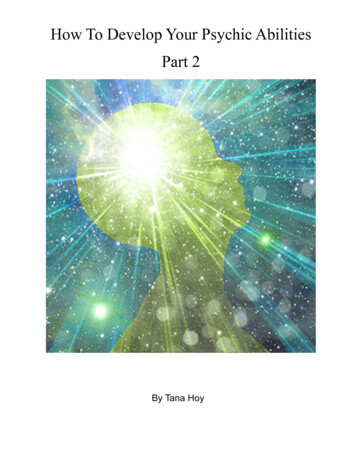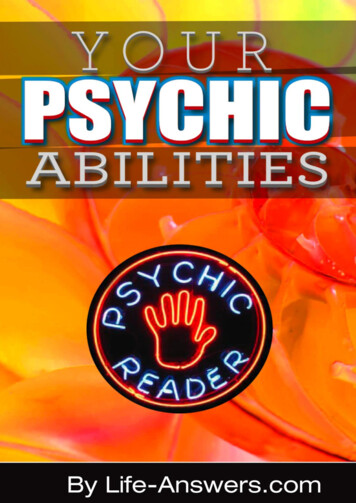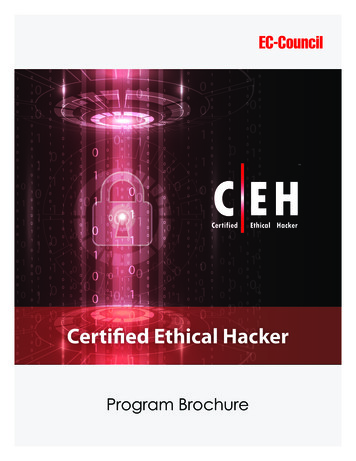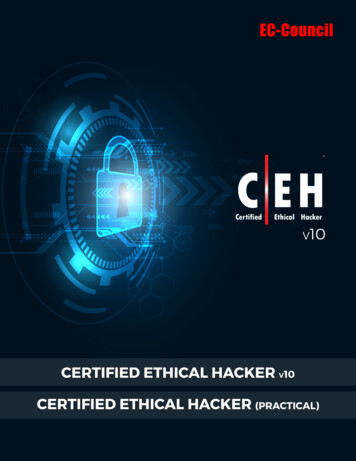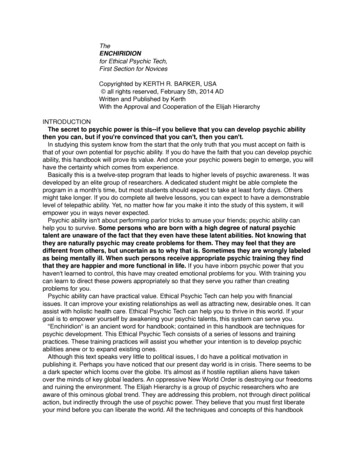
Transcription
TheENCHIRIDIONfor Ethical Psychic Tech,First Section for NovicesCopyrighted by KERTH R. BARKER, USA all rights reserved, February 5th, 2014 ADWritten and Published by KerthWith the Approval and Cooperation of the Elijah HierarchyINTRODUCTIONThe secret to psychic power is this--if you believe that you can develop psychic abilitythen you can, but if you're convinced that you can't, then you can't.In studying this system know from the start that the only truth that you must accept on faith isthat of your own potential for psychic ability. If you do have the faith that you can develop psychicability, this handbook will prove its value. And once your psychic powers begin to emerge, you willhave the certainty which comes from experience.Basically this is a twelve-step program that leads to higher levels of psychic awareness. It wasdeveloped by an elite group of researchers. A dedicated student might be able complete theprogram in a month's time, but most students should expect to take at least forty days. Othersmight take longer. If you do complete all twelve lessons, you can expect to have a demonstrablelevel of telepathic ability. Yet, no matter how far you make it into the study of this system, it willempower you in ways never expected.Psychic ability isn't about performing parlor tricks to amuse your friends; psychic ability canhelp you to survive. Some persons who are born with a high degree of natural psychictalent are unaware of the fact that they even have these latent abilities. Not knowing thatthey are naturally psychic may create problems for them. They may feel that they aredifferent from others, but uncertain as to why that is. Sometimes they are wrongly labeledas being mentally ill. When such persons receive appropriate psychic training they findthat they are happier and more functional in life. If you have inborn psychic power that youhaven't learned to control, this have may created emotional problems for you. With training youcan learn to direct these powers appropriately so that they serve you rather than creatingproblems for you.Psychic ability can have practical value. Ethical Psychic Tech can help you with financialissues. It can improve your existing relationships as well as attracting new, desirable ones. It canassist with holistic health care. Ethical Psychic Tech can help you to thrive in this world. If yourgoal is to empower yourself by awakening your psychic talents, this system can serve you."Enchiridion" is an ancient word for handbook; contained in this handbook are techniques forpsychic development. This Ethical Psychic Tech consists of a series of lessons and trainingpractices. These training practices will assist you whether your intention is to develop psychicabilities anew or to expand existing ones.Although this text speaks very little to political issues, I do have a political motivation inpublishing it. Perhaps you have noticed that our present day world is in crisis. There seems to bea dark specter which looms over the globe. It's almost as if hostile reptilian aliens have takenover the minds of key global leaders. An oppressive New World Order is destroying our freedomsand ruining the environment. The Elijah Hierarchy is a group of psychic researchers who areaware of this ominous global trend. They are addressing this problem, not through direct politicalaction, but indirectly through the use of psychic power. They believe that you must first liberateyour mind before you can liberate the world. All the techniques and concepts of this handbook
are based upon what they have taught me. Their system of psychic development offers a way tochallenge this matrix of deception through the awakening of your own mental powers. This is whyI am publishing a version of this handbook on the internet where anyone can make copies of it forfree. I encourage you to spread the word.Although these lessons were developed by Christians, you don't have to be a Christian to findthem useful; and in truth, these lessons make little reference to scriptures or Church doctrine.Furthermore, the principles found in these lessons were also derived from non-Christianphilosophies as well as advanced scientific insights. Personally, as a Christian, I believe that thetrue spirit of Christ's teachings is love, and the basis for all these lessons is love; so, in order tostudy this system, all you really need to believe in is love.Furthermore, this handbook doesn't really teach a belief system. The researchers whodeveloped this handbook did start off with a religious belief system. But in the process of theirresearch, they transcended their belief system while fulfilling it at the same time. They did this byexperiencing miracles. Religious indoctrination seeks to place limits upon your beliefs, but youdon't need indoctrination when you have the experience of miraculous revelation. Therefore thishandbook doesn't seek to tell you what to believe; instead it's a system which shows you how toexperience miracles.The validity of this system of psychic development is self-evident; that is, if you actually use it,you will be able to prove to yourself that it works. You don't have to agree with everything youread in the lessons. And you'll do better in studying this system if you don't become preoccupiedwith those teachings that don't seem right to you. Complete agreement with these lessons isn't arequirement for developing psychic ability. But you do need to study the lessons carefully. Even ifyou don't agree with everything you read, the study of these ideas will help to focus your mind incertain ways. And don't worry about having a full intellectual comprehension of all you read. It'sbetter to understand these lessons with your heart. These lessons have been designed to helpevoke an attitude conducive to psychic development. This isn't a system of indoctrination, sowhat you choose to believe is your responsibility.But you can only expect to enhance or develop psychic ability if you perform thetraining practices described at the end of each lesson; furthermore, you must perform allof them exactly as explained. There is nothing in these training practices that could degrade orharm you. The biggest complaint about them is that they do require some effort. Don't complainthat this system fails to work for you if you fail to perform these training practices. The sequenceof the lessons is deliberate. Every aspect of the training practices has been intentionallydesigned for valid reasons. However, until you complete the course, the reasoning behind all ofthis may not be obvious. Any form of technology requires exact application in order to work. ThisEthical Psychic Tech was developed by dozens of researchers over several decades, and simplyput, these are the the techniques that work to develop psychic ability.The developers of this system have an interest in using it to promote the liberation of humanity.The intention of The Enchiridion is to create a widespread movement of persons who empowerthemselves by developing psychic abilities. This will undermine the plans of the oppressive globaloverlords who seek to spiritually imprison the people of Earth. You become a part of thismovement by developing your own psychic abilities for the purpose of self improvement.However, as you improve your life, that in itself will subtlety change the nature of the world for thebetter. If you do decide to develop your psychic powers, you must be dedicated to using themethically with good will for others. However, it will be up to you to decide exactly what you shoulddo with your newly developed talents. Most people are basically good and will tend to use theirpsychic powers for good purposes. Those who choose to join this movement of psychicawakening may be members of any religion or of no religion at all.Many people in this contemporary society are phobic when it comes to psychic abilities; and so
there can be a great deal of resistance against taking the subject seriously. Therefore you haveto be self motivated. What you put into studying these materials is equal to what you will get outof them. All human beings are born with some potential for psychic ability. Depending upon theindividual, this ability may be expressed with different forms of psychic talent and with varyingdegrees of psychic power. This handbook teaches you to awaken your unique latent potential.The level of psychic power that you achieve through training will be determined by two factors-how much effort you put into studying this handbook and the nature of your own unique, inbornpsychic talent.The Enchiridion is divided into two major sections--a First Section for Novices and a SecondSection for Adepts. These may be referred to simply as the First Section and the Second Section.What you are reading now is the First Section. This introductory section consists of twelvelessons each of which is followed by one or more training drills. It's the repeated use of thesepractices which cause your talent to systematically emerge. Be sure to master these trainingpractices before attempting to study the Second Section for Adepts. The Second Sectioncontains advanced teaching which won't make sense until you've studied this introductory FirstSection. Even if you've developed some psychic abilities on your own, you should start with theFirst Section before studying the Second Section.The Enchiridion doesn't place limits on your potential for psychic ability. However, nobody isgoing to promise you that you'll achieve supernatural abilities like those depicted in sci-fi movies.Psychic powers initially emerge as subtle influences and intuitive insights. However these basicpsychic abilities, subtle as they are, can be extraordinarily empowering in helping you to achieveyour goals in life. This is a path to personal liberation more than anything else.It may be that mastering the First Section for Novices is all that you will ever want from TheEnchiridion. Mastering it should help you to live a better life. Psychic healing comes about as youattune yourself to the natural energies of the Cosmos. Clairvoyance is a natural abilitywhereupon you can directly intuit the truth of things. This psychic healing and naturalclairvoyance is what you will achieve in the study of this First Section.LESSON ONE: Study Technique for Psychic AdeptsNote to Contemporary Readers: In this lesson you will learn of a new type of study practice. Iassure you that you've never before heard of this system. Although this method has been usedfor decades by a private group of psychic researchers, I'm certain you've never used thistechnique because it's being publicly revealed here for the first time. Before you attempt to usethis unique reading method, I suggest that you first read this entire lesson in the manner younormally do.By learning a new way of study practice you can begin to train your telepathic abilities. This ishow a Psychic Adept studies written materials. When reading, a Psychic Adept will read eachsection of the text at least three times and possibly more. This is because a Psychic Adeptdesires to read not with speed but with full comprehension. But, for the purpose of psychictraining, this reading and rereading must be done in a structured way.The three readings go like this: In the first reading you intuitively scan the text looking for anywords you might need to look up in a dictionary for reference reasons. In the second reading yousubvocalize as you read, going through one sentence at a time, again looking for words to lookup, but this time reading for deep comprehension of each individual sentence. In the third readingyou read normally, without subvocalizing and without looking up words. In this final reading youare intellectually connecting your mind with the mind of the author.This type of mind to mind communication between the author and the reader isn't telepathy--butin some ways it's similar to telepathy. In reading a book you maintain a sustained mentalconcentration upon the thoughts of another human being--the same is true for telepathy. A
thought-form image is a mental picture which is deliberately held within the awareness of aperson. For example, close your eyes for a moment now and imagine that you're looking at abeautiful tree. Your conception of that tree is a thought-form image. When you read the mind ofanother human in telepathic practice, you maintain a sustained mental concentration on thethought-form images being projected by that person. In written literature, thought-forms aresuggested by the words of the author. So in studying the words of the author, you are mentallyconcentrating upon the thought-forms which the author intended to project through writing. Thisisn't exactly the same as how telepathy works, but there are some similarities. Therefore youneed to understand that this study system described here isn't just for academic purposes, it'salso a way for you to turn your reading practice into training for telepathy.In telepathic practice there is a Sender and a Receiver. The primary job of the Sender is to holda thought-form image clearly in his or her mind. In telepathy, as a Receiver, you intuitively scanthe mind of the Sender, then you subvocalize to yourself your intention to read the Sender'sprojected thought-form image. Finally you have a cognition (a realization) as to the information orthought-form which the Sender is projecting to you.Of course, telepathy is an advanced technique and there are many other training practices youhave to learn before you can expect to have reliable results. But the first level of training fortelepathy is to start reading written materials in the manner described here. As the reader of thistext, you are practicing your role as a telepathic Receiver. In telepathic practice the Receiver hasthe more difficult job. So you must build up your mental skills a little at a time in a systematic wayso that you can learn to be a Receiver. In studying this handbook, think of The Enchiridion itselfas the telepathic Sender whose thought-forms you must apprehend through the application ofmental concentration.There is a basic technique described in The Enchiridion that can be applied to a number ofpsychic practices. This multi-use technique is called scan/subvocalize/cognize. This three parttechnique is to first scan, then to subvocalize, and finally to cognize. (To subvocalize is to speakin a barely audible whispered voice.) For example, in making a psychic health diagnosis, aPsychic Healer would psychically scan the patient's body, then subvocalize the patient'sconcerns; and finally the Healer would clairvoyantly cognize the spiritual causes of those healthproblems. There are a number of other psychic practices where you may follow this pattern ofscan, subvocalize, and cognize. This means that you are first evoking your intuition, thensecondly evoking your language-based logic, and finally applying this synchrony of intuition andlogic to know something with certainty.This scan/subvocalize/cognize technique encourages the interplay between logic and intuition.The left hemisphere of the brain is associated with the mental quality of logic, and the right brainhemisphere is associated with intuition. When you clairvoyantly scan things, you are using thepart of your mind that is intuitive and feeling-oriented. When you subvocalize you bring yourattention into the part of your mind that is logical and language-oriented. However both of theseparts of mind are interconnected. When you use one aspect of mind you are always still using theother. The scanning process puts emphasis on the intuitive aspect of the mind, and thesubvocalizing puts emphasis on the logical aspect of mind. Finally when you achieve asynchrony of both intuition and logic, you fully cognize what it is you wish to know. This techniqueis something you can only truly understand by practicing it and experiencing it.I understand that this concept is unusual, so I will reiterate this idea. Although study may not bewhat you think of as a true psychic practice, it can create a basis for psychic practice. In readingthis handbook, you are experiencing a type of mind to mind communication between yourself andme, the author. This is, of course, different from telepathy because study is done via writtenlanguage and telepathy uses projected thought-form images. But in both cases you are mentallyapprehending another person's communication. The level of mental concentration it takes to read
literature is similar to the level of mental concentration it takes to read another person's mind. Sothis special type of study practice (where you condition yourself to focus your concentration innew ways) is a prerequisite to your advanced psychic training.This is how the scan/subvocalize/cognize technique is applied to reading. In the PsychicAdept's study-practice, the defining of words is an important aspect of the process. Therefore thisstudy practice may be described as scan-define/subvocalize-define/read-cognize. This is how itworks:{Step One: First you intuitively scan a section of written materials looking for any word whosedefinition feels uncertain to you; you make a list of all such words; and then you completelydefine each of those terms using a dictionary. You will scan the text by quickly looking over thetext from beginning to end, briefly glancing at each word in sequence from beginning to end.During this scanning pay attention to what you feel and pay attention to any physical sensationswhich might arise. Consider this fact--when students come across a word whose definition isuncertain to them, they sometimes yawn. A yawn is a good clue that you've come across a wordyou need to define with a dictionary. In this scanning for words to look up in a dictionary--you'renot using your logic so much as your sense of intuition to feel which words you need to look up. Ifyou sense that you've passed a misunderstood word as you're scanning, you can look back inthe text and see if it pops up at you.Don't worry about it if you have difficulty doing this at first, just do the scan by moving a pointeracross each line of written materials to briefly glance at each word. In the scanning part of thisprocess try to avoid reading, just look at the words the way you would look at a series ofmeaningless objects--like flowers in a garden. The more you practice scanning, the more you'lldiscover that certain words will seem to jump out at you--you'll come to automatically sense thosewords which you need to look up in a dictionary. When this happens, write down each such wordin a list and then go on with the scan. Once the scan is over, only then do you refer to thedictionary, which you will use to look up all the words on the list one at a time.Step Two: Next, you then reread that section a second time whereupon you'll subvocalize whatyou are reading while you read it. To subvocalize is to speak something in a barely audiblewhispered voice. By subvocalizing, you are focusing your attention upon the meaning of eachindividual sentence. In doing this you may find more words to define with a dictionary as you goalong. In this step you focus your attention upon your logic. Any time a sentence doesn't seemlogical, it's probably because that sentence contains a word whose proper definition is uncertainto you; or there may be a word from a preceding sentence whose definition you need to check.Words often have multiple meanings, so even if you're familiar with a word, there may be adefinition for that word with which you're not familiar. If you have any doubts at all about themeaning of a word, look it up. In The Enchiridion there is a word list at the bottom of somelessons. You should consult it, and use it as necessary in your study. This system has a uniqueterminology and these word lists are essential to mastering this terminology. In this second step,read and if necessary reread each individual sentence until its meaning is logical. You may ormay not agree with what the sentence says, but in this step you're using your logic to decode thesentence's intended meaning. And you should know that a strong feeling of disagreement withwhat you are reading is often an indication that there's a word or words somewhere in the textwhich you need to look up. As you subvocalize, pay attention to your emotional reactions;negative feelings are an indication that you should look back in the text for words whosemeanings are uncertain to you.Step Three: Finally, you read the text a third time without defining words in a dictionary andwithout subvocalizing--this final reading is for a more holistic sense of understanding what you'veread. So in the third reading you're apprehending the message of the overall text rather than justthe meaning of its individual sentences. It's in this third reading that you'll fully cognize the
intended message of the author.}Before you attempt to use this scan/subvocalize/cognize technique in studying the Enchiridion,you should practice this technique on a short written text which is easy to read. At the end of thislesson, a training practice will be described in which you do just that.If a text is highly challenging, you may have to read and reread it more than three times; but thetypical pattern of study used by a Psychic Adept is to first scan the text sensing those wordswhose meanings are uncertain, secondly to read while subvocalizing to make sure that themeaning of each sentence is clear, and thirdly to read lucidly in a fluid manner to take in theoverall meaning of the text.During the scanning process take a pointer, such as a pencil, and slowly move it over each lineof a section of written materials--starting at the beginning and moving through to the end. In thisscan you are quickly pointing at each word and then moving to the next one until you hit upon aword whose meaning feels uncertain to you. In this first scan you are not reading forcomprehension, you are only searching for those words in the text whose meanings you don'tfully understand. As you scan, line by line, through the text, you will focus your attention uponhunting for any word whose meaning feels unclear. Whenever you find such a word, write it downon a list. When you learn to do this correctly, you will have trained yourself to intuitively sense thewords that you need to look up in a dictionary. In this scan of the text you will only hunt for wordswhich you sense you may need to clarify with a dictionary. This means that this scanning processwill be done quickly.Do not, do not, do not try to determine the meaning of an uncertain word by guessing at itsmeaning from the context of the text. That's how the foolish mundane students practice. Onemistake that novices often make is that they fail to make a frequent use of the dictionary. Always,always, always use a dictionary to determine the meaning of an uncertain word.Some dictionaries are better than others. Use a dictionary which lists all the different usages foreach word as well as root words. Psychic Adepts make a frequent use of dictionaries whenstudying; so make sure you have access to a good dictionary. It's always important to a PsychicAdept to have a lucid understanding of anything he or she reads. This is true whether you arereading a book or reading a mind.You must become adept at using a dictionary. When defining a word with a dictionary look atthe definition that best applies within the context of its sentence. Take your time in studying worddefinitions. Semantics is important. During the 1930s, many educators began to realize thesignificance of semantics to the study process. The contemporary dictionary is the toolboxcreated from this development of semantical technology. It's good to understand the root wordsfrom which modern words are derived. Furthermore, Psychic Adepts enjoy using theirimaginations whenever possible. So when you're defining a new word, you should use yourimagination to make up several sentences which utilize this newly defined word. Make upsentences until you feel comfortable in your understanding of that word's definition.Example: You're scanning a text and you come across this sentence--"Janis Joplin was killedby the rock and roll zeitgeist of the 1960s." Suppose you sense that you need to look up what"zeitgeist" means. If you were to guess at the meaning from its context, you might misinterpretthe sentence completely, assuming perhaps that a zeitgeist is a type of serial killer. So instead ofguessing at the meaning, you look it up and find out that the word zeitgeist is defined as the spiritof the times. So you reread the sentence and it makes sense. Rock and roll musicians in thesixties were known to do drugs excessively, and Janis Joplin was known to have died of a drugoverdose. But you haven't really made the word zeitgeist a part of your vocabulary until you'vepersonally made up a number of sentences each of which uses that newly defined word. Thesewould be sentences like--"To the despair of some music critics, disco became the zeitgeist of thelate 70s."
Vocabulary is essential to semantical intelligence. Every time you learn a new word you'reincreasing your semantical intelligence. Think of each newly defined word as a new tool whichyou can use to communicate with others. Communication of various kinds is the heart of psychicability. An increased vocabulary expands intellectual power. By defining new terms you'reimproving your personal vocabulary toolbox--thereby increasing your mental power. Psychicpower is a form of mental power, so by increasing your semantical intelligence you're therebyincreasing your overall mental power.After you scan the text and create semantical clarity by using a dictionary, you then read slowlywhile subvocalizing what you read. During this subvocalization process, you may discoversentences which you don't fully understand. Analyze any such sentence--looking again for wordswhose meanings may not be entirely understood. Don't be afraid to use a dictionary. Frequentuse of a dictionary in study is not a sign of ignorance--it's an indication of intelligence. You maybelieve that people are born to be either intelligent or stupid--but that's not the case. People tendto be as intelligent as they choose to be.After you have scanned, defined, subvocalized, and defined more--you then reread the sectionof text a third time--this time just for full understanding. To cognize is to know. In this final readingyou come to fully cognize the author's message. In reading a text you may agree or disagree withwhat an author has written. Nevertheless, in truth, you cannot authentically judge the verity of theauthor's message until you have achieved semantical clarity through dictionary use.Although a dictionary is a most useful tool in creating semantical clarity, sometimes it's notenough. You may come across a situation where an author is either imprecise or creative in theuse of words. Some authors do not themselves understand the correct meanings of the wordsthey use. Also there are authors who are creative in the use of words and take words which arein common usage but endow those words with expanded meanings; thus the author is creating aunique usage for a previously defined word.An example of this is the word "hacker." The root word for hacking referred to the process ofbreaking up branches, as if for kindling--so a hacker would be someone who created kindling bychopping up wood--with his hands. However, the term hacker evolved over time to describeanyone who fixed things, like toy trains, by tinkering around with them--with his hands. Earlycomputer programmers tinkered around with equipment and programs to make them work, sothey took on the term hacker. Now the term hacker is often used for a skilled computertechnician--which has nothing to do with the original meaning.So there are times in which words take on expanded meanings to such an extent that theoriginal definitions no longer make sense. In such cases a dictionary alone may not provideclarity. Thus, if you decide that the author's writings are nonetheless worthy of study, you may beforced to study the text over and over until you can decode the author's peculiar terminology. Thegoal is always a lucidity of understanding, and this requires both dictionary use and persistentstudy.You should read and reread as much as you need to until the meaning of a text is lucid.However, if a text is fairly easy and short--you may simply scan once--then (if necessary) defineany uncertain words--subvocalize the entire text--and finally reread the entire text fluidly forcognition. Once you've mastered this process, it won't take any longer than normally study. Infact, many persons who have mastered this technique have found that they study much fasterthan before.However, if a text is long or difficult, you should break it down into shorter study sections. If youwere studying a highly technical volume you might break the study sections down intoparagraphs. You have to consider your own reading skill and use your common sense in dividinga text into study sections. Conquer each of these shorter sections before going on to the nextone. The rule of thumb is this--the easier the text is to read, the longer the study sections should
be--but the more difficult the text is to read, the shorter the study sections should be.As well as this scan/subvocalize/cognize technique for study, there are also other insights thatenhance study skill.The contemporary education system tends to treat study as a chore which must be endured,but this attitude is counterproductive; therefore you should do what you can to develop theattitude that study is an enjoyable task. Choose or create an appropriate study environment. Youmay use a sound system to play relaxing instrumental music softly in the background to set apositive ambiance. Study at a time when your mind is clear and your emotions untroubled. Avoidinto
movement by developing your own psychic abilities for the purpose of self improvement. However, as you improve your life, that in itself will subtlety change the nature of the world for the better. If you do decide to develop your psychic powers, you must be ded
